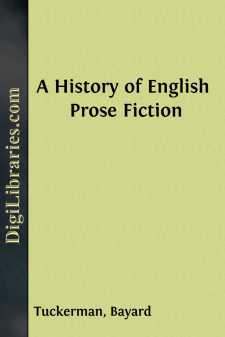Categories
- Antiques & Collectibles 13
- Architecture 36
- Art 48
- Bibles 22
- Biography & Autobiography 813
- Body, Mind & Spirit 142
- Business & Economics 28
- Children's Books 17
- Children's Fiction 14
- Computers 4
- Cooking 94
- Crafts & Hobbies 4
- Drama 346
- Education 46
- Family & Relationships 57
- Fiction 11829
- Games 19
- Gardening 17
- Health & Fitness 34
- History 1377
- House & Home 1
- Humor 147
- Juvenile Fiction 1873
- Juvenile Nonfiction 202
- Language Arts & Disciplines 88
- Law 16
- Literary Collections 686
- Literary Criticism 179
- Mathematics 13
- Medical 41
- Music 40
- Nature 179
- Non-Classifiable 1768
- Performing Arts 7
- Periodicals 1453
- Philosophy 64
- Photography 2
- Poetry 896
- Political Science 203
- Psychology 42
- Reference 154
- Religion 513
- Science 126
- Self-Help 84
- Social Science 81
- Sports & Recreation 34
- Study Aids 3
- Technology & Engineering 59
- Transportation 23
- Travel 463
- True Crime 29
A History of English Prose Fiction
by: Bayard Tuckerman
Categories:
Description:
Excerpt
CHAPTER I.
THE ROMANCE OF CHIVALRY.
I
In the midst of an age of gloom and anarchy, when Feudalism was slowly building up a new social organization on the ruins of the Roman Empire, arose that spirit of chivalry, which, in its connection with the Christian religion, forms so sharp a division between the sentiments of ancient and modern times. Following closely on the growth of chivalry as an institution, there came into being a remarkable species of fiction, which reflected with great faithfulness the character of the age, and having formed for three centuries the principal literary entertainment of the knighthood of Europe, left on the new civilization, and the new literature which had outgrown and discarded it, lasting traces of its natural beauty. Into the general fund of chivalric romance were absorbed the learning and legend of every land. From the gloomy forests and bleak mountains of the North came dark and terrible fancies, malignant enchanters, and death-dealing spirits, supposed to haunt the earth and sea; from Arabia and the East came gorgeous pictures of palaces built of gold and precious stones, magic rings which transport the bearer from place to place, love-inspiring draughts, dragons and fairies; from ancient Greece and Rome came memories of the heroes and mysteries of mythology, like old coins worn and disfigured by passing, through ages, from hand to hand, but still bearing a faint outline of their original character. All this mass of fiction was floating idly in the imaginations of men, or worked as an embellishment into the rude numbers of the minstrels, when the mediæval romancers gathered it up, and interweaving it with the traditions of Arthur and Charlemagne, produced those strange compositions which are so entirely the product and repository of the habits, superstitions, and sympathies of the Middle Ages that they serve to
"Hold the mirror up to Nature,To show Vice its own image, Virtue its own likeness,And the very age and body of the times,His form and pressure."The men who wrote, and the men who read these romances, the first springs of our modern fiction, were influenced by two dominant ideas: "One religious, which had fashioned the gigantic cathedrals, and swept the masses from their native soil to hurl them upon the Holy Land; the other secular, which had built feudal fortresses, and set the man of courage erect and armed within his own domain."
These two ideas were outwardly expressed in the Roman Church and the Feudal System.During the anarchy of the Middle Ages, every man was compelled to look upon war as his natural occupation, if he hoped to preserve life or property. His land was held as a condition of military service. As long as there was no effective administration of justice, redress for the aggrieved lay in the sword alone. A military career had no rival in the eyes of the ambitious and the noble. There was no learning, no art, to share with skill in arms, the honors to which a youth aspired. Religion and love, the most powerful inspirations of his moral life, made force of arms the merit most worthy of their rewards....


